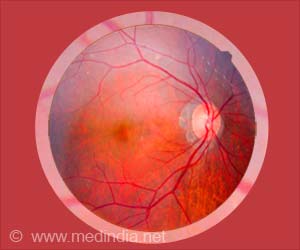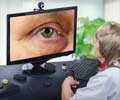Diabetic retinopathy affects persons with type 1 diabetes more quickly and can be avoided by strictly regulating blood sugar and blood pressure levels.

- A US study suggests that actively regulating blood sugar and blood pressure can prevent diabetic retinopathy in young diabetics
- Diabetic retinopathy is a common eye disorder among young diabetics, affecting both Type 1 and Type 2 diabetes patients
- Early detection and regular eye exams are crucial for preventing diabetic retinopathy and other diabetic eye complications
Diabetic Retinopathy
Go to source). A new US study, however, claims that this ailment, known as diabetic retinopathy, can be avoided in people with juvenile diabetes if they actively regulate their blood sugar and blood pressure levels. According to the study, which was published in the journal Diabetes Care by the American Diabetes Association, diabetes retinopathy is common in young people with diabetes, with 52% of those with Type 1 diabetes and 56% of those with Type 2 diabetes exhibiting retinal abnormalities at follow-up (2✔ ✔Trusted Source
Prevalence, Progression, and Modifiable Risk Factors for Diabetic Retinopathy in Youth and Young Adults With Youth-Onset Type 1 and Type 2 Diabetes: The SEARCH for Diabetes in Youth Study
Go to source).
However, experts in India say that the general public is unaware of diabetic retinopathy. "Be aware of your fasting, postprandial, and HbA1c numbers. If you have diabetes, you should receive a baseline retinal picture and an annual check-up. Start early with lifestyle management, such as physical activity and a well-balanced diet, to prevent diabetes and its complications," says Dr. S Natarajan, president of the Asia Pacific Ophthalmic Trauma Society.
What is Diabetic Retinopathy?
Diabetic retinopathy is an eye disorder that can result in vision loss and blindness in diabetics (3✔ ✔Trusted SourceDiabetic Retinopathy: Pathophysiology and Treatments
Go to source). High blood sugar levels have an effect on blood vessels in the retina, which is the light-sensitive layer of tissue at the back of the eye. The injured tissue reduces oxygen delivery to the retina and causes swelling as the eye attempts to build new blood vessels. The eye is harmed because these new blood vessels do not form properly and can leak easily. Sometimes, retinal blood vessel injury causes an accumulation of fluid (edema) in the retina's center (macula) and the vitreous chamber.
Scar tissue from the formation of new blood vessels might eventually cause the retina to detach from the back of your eye. The fluid pressure can damage the nerve that sends images from your eye to your brain (optic nerve), resulting in glaucoma. Diabetic retinopathy is normally asymptomatic until the retina detaches and vision fades. "This is why it's important to detect diabetes at a young age," explains Dr. Natarajan.
Diabetic Eye Complications: Beyond Retinopathy and Cataracts
By 2030, the overall number of diabetic retinopathy cases (both vision-threatening and non-threatening) worldwide is predicted to reach 191 million (4✔ ✔Trusted SourceThe worldwide epidemic of diabetic retinopathy
Go to source). With over 100 million diabetics in India and at least 58% unaware that they have this metabolic illness, combining an eye exam with diabetes screening becomes critical. Apart from diabetic retinopathy, the younger population with diabetes is also prone to cataracts.
How to Spot Early Retinal Changes
The prognosis of diabetic retinopathy is determined by the stage of the disease. With the help of contemporary management techniques, vision can be retained or restored if discovered early. This would entail strict diabetes control, the use of retinal lasers, injections, and so on. Vitreoretinal surgery may be required in advanced stages, with a guarded visual prognosis (5✔ ✔Trusted SourceThe Evolving Treatment of Diabetic Retinopathy
Go to source).
There are cutting-edge technologies for detecting diabetic retinopathy, such as wide-field fundus photography (which provides a broad field picture of the retina without dilation of the pupil) and retinal OCT, which shows extremely early retinal edema. AI is also being used to diagnose diabetic retinopathy in remote regions, allowing for timely referrals and the preservation of vision. There are currently approximately 25,000 ophthalmologists and 30,000 optometrists serving a population of 1.4 billion. "However, with the primary goal of early detection, even unskilled workers can be trained on how to use a mobile phone, the apparatus, and take photographs. We can protect the eyes," Dr. Natarajan explains. Even if your vision appears to be fine, you should have an annual eye exam with dilation if you have diabetes.
References:
- Diabetic Retinopathy - (https://www.ncbi.nlm.nih.gov/books/NBK560805/)
- Prevalence, Progression, and Modifiable Risk Factors for Diabetic Retinopathy in Youth and Young Adults With Youth-Onset Type 1 and Type 2 Diabetes: The SEARCH for Diabetes in Youth Study - (https://pubmed.ncbi.nlm.nih.gov/37043887/)
- Diabetic Retinopathy: Pathophysiology and Treatments - (https://pubmed.ncbi.nlm.nih.gov/29925789/)
- The worldwide epidemic of diabetic retinopathy - (https://pubmed.ncbi.nlm.nih.gov/22944754/)
- The Evolving Treatment of Diabetic Retinopathy - (https://pubmed.ncbi.nlm.nih.gov/32184554/)
Source-Medindia















